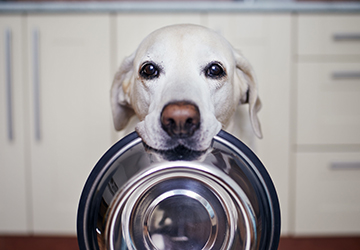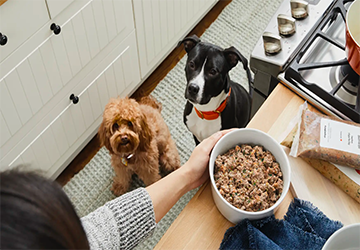Why Organic Pet Food Is Worth the Investment
In recent years, there's been a marked shift in consumer behavior towards organic products, which has spilled over into the pet food industry. More than ever, pet owners seek organic options for their furry companions. While organic pet food can sometimes come with a higher price tag, many believe that the benefits to their pets' health and well-being make it a worthy investment. Here, we delve deep into organic pet food, exploring its benefits and how it measures against non-organic alternatives.
Benefits of Organic Pet Food
"Organic" refers to how agricultural products are grown and processed. Synthetic insecticides, GMOs, petroleum-based fertilizers, and fertilizers made from sewage sludge are not allowed to cultivate organic crops. Organic meat is meat from animals without any antibiotics or growth hormones throughout their upbringing.
For pet food to be labeled organic, it must meet these stringent standards. The benefits of feeding your pet organic food include:

● Fewer Chemicals and Pesticides: Organic pet foods reduce the risk of your pet ingesting harmful chemicals and pesticides commonly found in conventional pet foods.
● No Antibiotics or Synthetic Hormones: With organic pet food, you're assured that the meat sources didn't come from animals pumped with antibiotics or growth hormones. This means a lesser risk of antibiotic-resistant infections and hormone-related issues in pets.
● Enhanced Nutritional Value: Organic products often have more beneficial nutrients, including antioxidants, than their conventionally grown counterparts.
● Better Digestibility: Organic foods can be more accessible for pets, which means better nutrient absorption and fewer digestive issues.
Organic vs. Non-organic Pet Food
While non-organic pet foods can still offer nutritional value, there are stark differences between them and their organic counterparts. Conventional pet foods may contain by-products, fillers, and artificial preservatives. These can lead to allergies, digestive problems, and other health issues in pets over time. Organic pet foods, on the other hand, tend to prioritize high-quality, natural ingredients without fillers or artificial additives.
Nutritional Value of Organic Pet Food
Organic pet foods are often made from better-quality ingredients than conventional products. This results in a higher concentration of essential nutrients. For instance, organic fruits and vegetables are proven to contain higher levels of antioxidants, vitamins, and minerals. Similarly, organically raised animals tend to produce meat richer in specific nutrients, including omega-3 fatty acids.
Moreover, without fillers, each bite of organic pet food often packs more nutritional value, ensuring your pet gets the most out of their meals.
Health Improvements with an Organic Diet
Switching to an organic diet can lead to discernible health improvements in pets. Owners often report a shinier coat, fewer skin ailments, increased energy levels, and better overall vitality. Moreover, an organic diet can boost the immune system, making pets less susceptible to illnesses.
Reducing the intake of artificial additives and chemicals can also lessen the chances of chronic diseases in the long run. For instance, avoiding growth hormones and pesticides can significantly decrease the risk of hormone-related cancers and other disorders.
Ethical Implications of Organic Pet Food
Choosing organic goes beyond the immediate health benefits it offers to our pets. It also touches on ethical considerations. Organic farming practices are typically more humane and prioritize animal welfare. By choosing organic pet food:
● Promotion of Humane Treatment: Animals raised for organic meat often live in better conditions than in conventional farming setups. They typically have more space to move around and access the outdoors and are treated more humanely.
● Reduced Environmental Footprint: Organic farming practices are more sustainable and environmentally friendly. There's less reliance on synthetic chemicals, which can seep into the ground and water, causing long-term environmental damage. By supporting organic farming through purchasing organic pet food, consumers indirectly support a more sustainable agricultural system.

Environmental Benefits of Organic Pet Food
● Soil Health: Organic farming practices often lead to better soil health. Without the continuous use of synthetic chemicals, the soil retains more natural nutrients and beneficial organisms, fostering a more robust ecosystem.
● Water Quality: Chemical run-offs from conventional farms can contaminate water sources, affecting aquatic life and the communities relying on these water sources. Organic farms significantly reduce this risk.
● Biodiversity: Organic farms support higher biodiversity, attracting insects, birds, and other wildlife. This diversity can help maintain a more balanced and resilient ecosystem.
Common Misconceptions Surrounding Organic Pet Food
● "It's Just a Marketing Gimmick": Some believe "organic" is a marketing ploy without tangible benefits. However, for a product to be certified organic, it must meet rigorous standards set by regulatory bodies.
● "Organic Means 100% Natural": While organic pet foods eliminate many synthetic chemicals, it doesn't always mean they are entirely free from all processing or additives. It's crucial to read the label and understand what you're buying.
● "All Non-Organic Foods Are Bad": This isn't necessarily true. Some non-organic pet foods can still offer quality nutrition. However, organic foods provide an additional assurance regarding the absence of certain chemicals and harmful practices.
Making the Transition to Organic
Deciding to switch your pet to an organic diet is a commendable step towards ensuring they receive the best nutrition possible. This choice reflects a commitment to their health and a more sustainable and ethically sound way of living. However, just like any significant change in diet, transitioning to organic pet food requires careful planning and execution to ensure it’s smooth and beneficial for your pet.
Understanding the Need for a Gradual Transition:
Like humans, animals have digestive systems that become accustomed to a specific type of food and its ingredients. A sudden change, even to a healthier option, can cause digestive disturbances, like diarrhea or vomiting. Their gut flora — the beneficial bacteria that aid digestion — need time to adjust to the new food components.
Final Thoughts:
The journey into organic pet food is more than just a dietary choice; it's a commitment to a healthier, more humane, and environmentally-conscious lifestyle for our beloved companions. While the initial investment might be higher, the holistic benefits — from improved pet health to ethical satisfaction and ecological preservation — undoubtedly make it a choice worth considering for every responsible pet owner.




